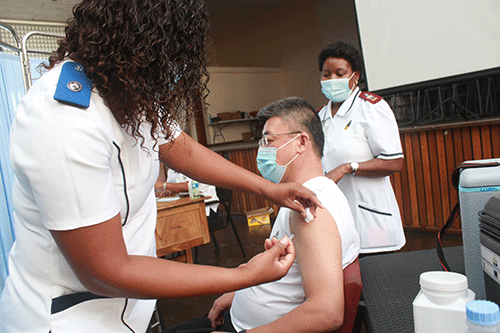The Health Defence League (HDL) does not have legal standing to represent those it claims to, the High Court has ruled.
The HDL purported to represent 537 people who sued the government for its alleged refusal to provide the public with information on the safety and possible adverse effects of Covid-19 vaccinations administered during the pandemic. Yesterday, however, Deputy Judge President Hosea Angula said the group failed to prove they had the legal standing to institute the suit, nor did HDL prove it is entitled to the orders it sought.
“The locus standi at issue in these proceedings is the procedural one, which concerns the applicants’ sufficiency and directness of interest in the proceedings, which entitles them to the relief claimed in the notice of motion. In addition, they have to establish that they are aggrieved persons within the meaning of Article 25(2) of the Constitution,” he said.
Furthermore, only one of the individuals requested information from the government, but he and the group failed to make a case that they were aggrieved, the judge said.
“It has been held that where the issue of locus standi has been argued separately from the merits and is upheld, that would finally resolve the matter. Accordingly, the applicants’ application stands to be dismissed,” Angula continued.
In the suit, the group wanted the High Court to direct the government, President, health ministry, education ministry, Attorney General and the Namibia Medicines Regulatory Council to provide their source of information and the information itself on which they relied when they informed the public that the Covid-19 vaccines were safe and effective for people with chronic illness and would help prevent serious illness, hospitalisation and death from Covid-19 infection. Raymond Heathcote, the group’s lawyer, said the suit was not about whether vaccination is good or bad, it is about the right to receive information to make informed choices, and the government’s duty to make such information available to the public.
He said the source of the right to the information sought does not only lie in Article 18 of the Constitution, as so incorrectly and opportunistically assumed by the respondents, but in a range of other identified and pleaded Articles of the Namibian Constitution, as well as a number of pertinently pleaded international obligations binding on the Namibian state.
He further said all the government needed to do was provide information about all possible side-effects. In court documents, health minister Kalumbi Shangula said the group’s intent to give rise to a debate on the efficacy of Covid-19 vaccines goes far beyond Namibian borders. The suit also seeks to challenge the government’s policy on the administration of Covid-19 vaccines, he said. He further said all the information requested by the group is readily available publicly, and some has been published by the World Health Organisation and the ministry in notices.


